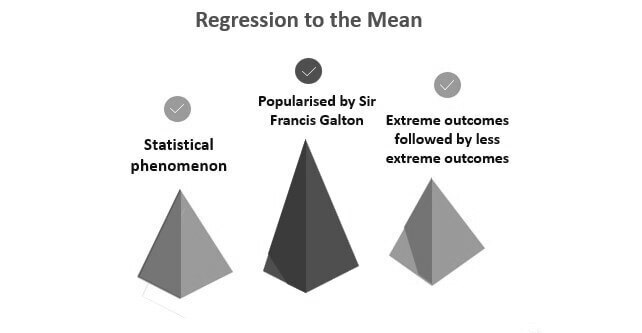Introduction
In the realm of decision-making, understanding the underlying mental models that shape our perceptions is crucial. One such mental model that often leads to misguided judgments is the concept of Regression to the Mean. Rooted in human psychology, this phenomenon refers to the tendency for extreme outcomes to be followed by more average outcomes. In this comprehensive blog post, we will explore the concept of Regression to the Mean, its prevalence in our daily lives, and the implications it has on decision-making processes. We will delve into real-life examples, discuss the biases that contribute to this phenomenon, and provide practical strategies to avoid falling prey to this mental trap.
Defining Regression to the Mean
Regression to the Mean is a statistical concept that describes the tendency for extreme values to move closer to the average over time. It suggests that when we observe an outlier event—be it exceptionally high or low—the subsequent events are likely to be closer to the average. This regression occurs due to random variations in data, which tend to even out over time. Regression to the Mean operates on the principle that extreme outcomes are typically the result of a combination of skill and luck, and that the luck component tends to revert to average levels.
Relevance in Decision-Making Processes
Understanding Regression to the Mean is vital for making informed decisions. Failing to recognize this concept can lead to irrational judgments and misguided expectations. By expecting extreme outcomes to persist indefinitely, individuals may make poor choices based on exceptional circumstances. For instance, investors might be lured into investing in a stock that has recently experienced extraordinary returns, assuming the trend will continue. However, the reality is that the stock is likely to regress to its mean performance over time.
The prevalence of Regression to the Mean in our lives
Regression to the Mean is a pervasive force in our daily lives, impacting various domains such as personal decision-making, business strategies, and public policy-making. Let’s examine three distinct examples to illustrate this phenomenon
- Personal Life Decisions: Consider a student who achieves exceptional grades on a particular exam. This outcome could be the result of a combination of both skill and luck. If the student attributes their success solely to skill and neglects the role of luck, they may develop an inflated sense of confidence and expect similar extraordinary results on future exams. However, without a sustained effort or improvement in skill, the subsequent exam scores are likely to regress closer to the student’s average performance.
- Business Scenarios: In the realm of business, Regression to the Mean can influence decision-making processes. Imagine a startup that experiences an exceptional surge in sales during its initial launch phase. The founders may attribute this success to their business strategy alone, leading them to expand rapidly and make substantial investments. However, without careful consideration of other factors such as market conditions and timing, the subsequent sales may regress to the mean, potentially causing financial strain and setbacks.
- Public Policy-Making: Regression to the Mean can also influence public policy decisions. For example, if a city experiences a significant decrease in crime rates for a specific year, policymakers may attribute it to a particular intervention or policy change. However, failing to consider random fluctuations and regression to the mean, policymakers may overestimate the effectiveness of the intervention and allocate resources disproportionately, disregarding other potential contributing factors.
Mental Biases and Psychological Underpinnings
Various mental biases contribute to the occurrence of Regression to the Mean. The most prominent bias is the Availability Heuristic, which occurs when individuals rely on readily available examples or instances that come to mind easily. When extreme outcomes are vivid and memorable, people tend to overweight them and neglect the fact that they are outliers. This bias reinforces the expectation that future outcomes will mirror these exceptional results, leading to irrational decision-making.
Additionally, the Confirmation Bias plays a role in Regression to the Mean. People tend to seek information that confirms their existing beliefs or expectations. When extreme outcomes occur, individuals may selectively seek evidence that supports the continuation of those outcomes, reinforcing their misguided expectations.
Avoiding the Regression to the Mean Trap
To avoid falling prey to Regression to the Mean, it is essential to cultivate awareness and apply objective decision-making strategies. Here are some practical tips:
- Understand the concept: Educate yourself about Regression to the Mean and familiarize yourself with its occurrence in various domains. Recognizing this mental model will help you question your expectations and decisions more critically.
- Analyze the data: When faced with exceptional outcomes, take a step back and analyze the underlying data. Look for trends, consider other contributing factors, and question whether the extreme outcome is sustainable or merely a result of luck.
- Diversify and be realistic: In investment or personal decision-making, avoid overcommitting to a specific course of action solely based on extreme outcomes. Diversify your portfolio or options and set realistic expectations that account for the tendency of results to regress to the mean.
- Seek diverse perspectives: Engage with a diverse group of people who can challenge your assumptions and provide alternative viewpoints. This will help you avoid confirmation bias and foster a more well-rounded decision-making process.
Conclusion
Regression to the Mean is a potent mental model that influences decision-making processes across various domains of life. By understanding the concept, being aware of mental biases, and applying practical strategies, we can avoid falling into the trap of misguided expectations. Recognizing the prevalence of Regression to the Mean and actively working towards objective decision-making allows us to make more informed choices, leading to better outcomes in both personal and professional spheres.
